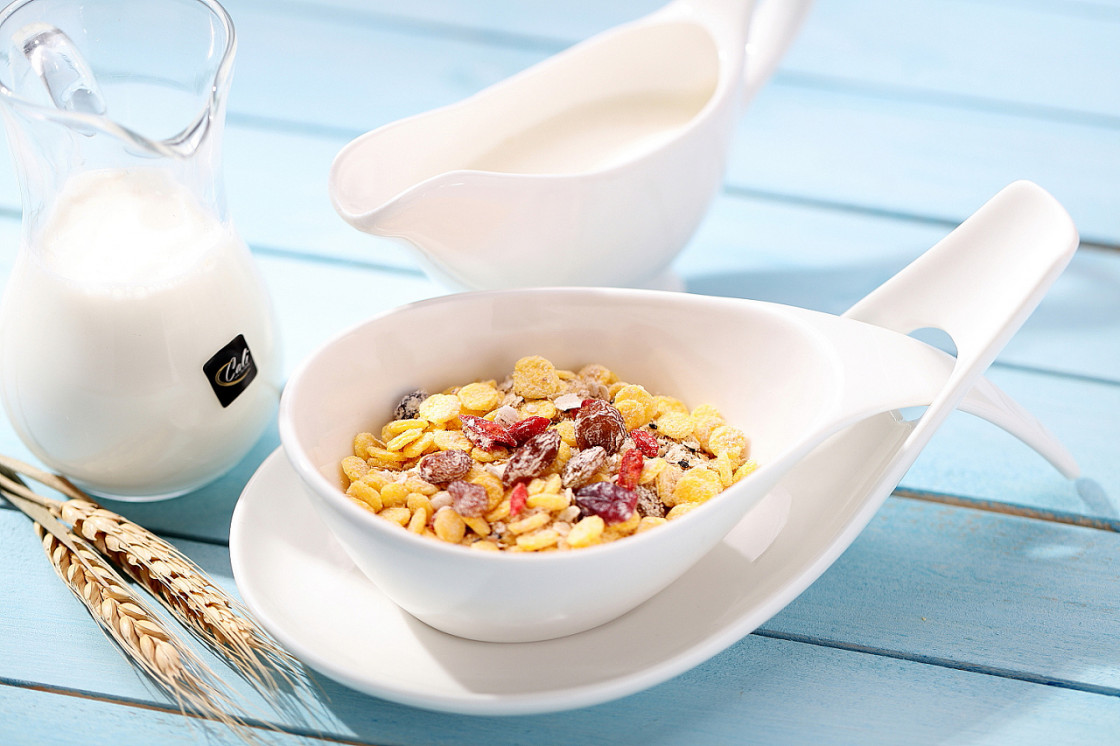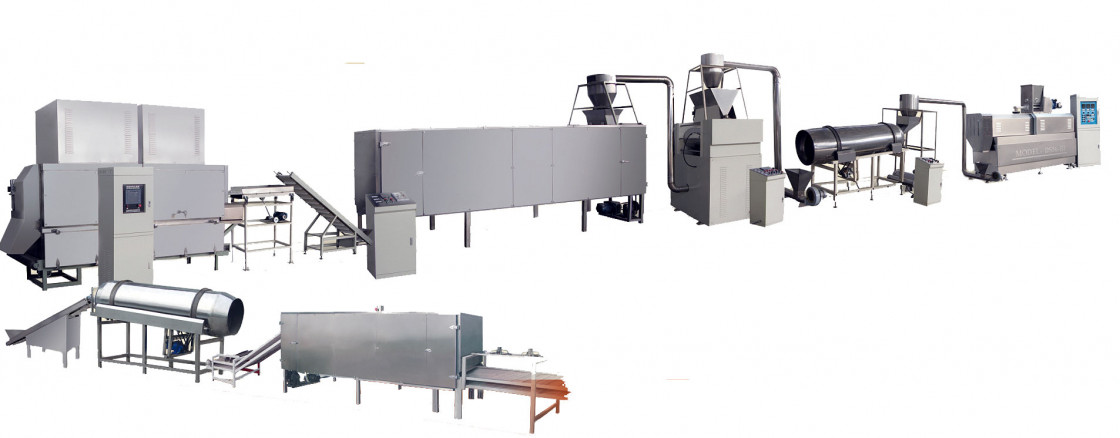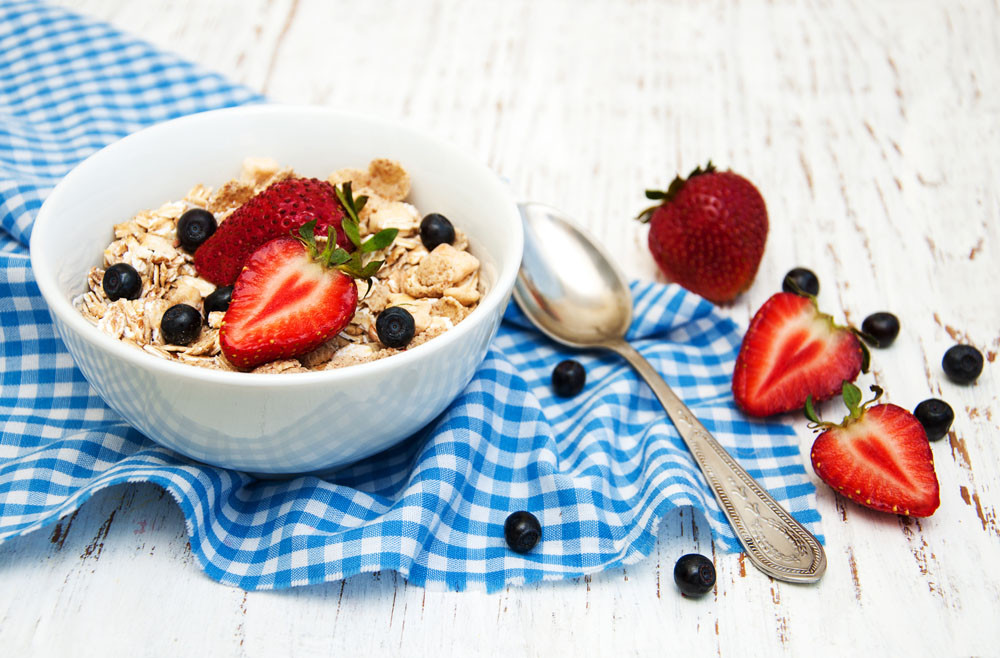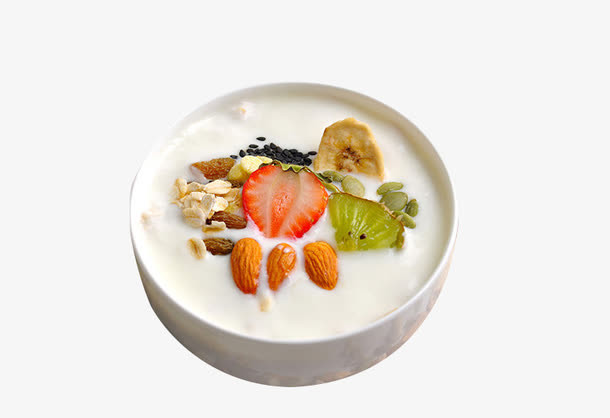Breakfast Cereal Process Line

Breakfast Cereals is a kind of breakfast food which is processed into flakes with corn, rice, wheat and oats as the main raw materials, then added milk (cold food) or boiled for a short time (hot food). The characteristics of this kind of food are: (1) beneficial to health. Breakfast cereals are made from various kinds of cereals, which are rich in food fibers and have certain health effects on the body. (2) balanced nutrition. A variety of grain combinations plus milk, nutrition is balanced. (3) Natural quality. This kind of food is basically natural raw materials, generally without artificial additives. (4) Eating conveniently. Breakfast cereals are easy to eat, whether ready-to-eat or quick-boiled.

Most developed countries, such as Europe and the United States, have a long history of development. They have developed breakfast cereals with different characteristics according to the characteristics of raw materials and people's dietary habits. It is reported that the annual output of world cereal breakfast reaches 3.2 million tons, and the sales amount is 16.6 billion US dollars. The United States is the largest market for breakfast cereals, accounting for about half of the quantity and about 60% of the sales. The market of breakfast cereals in Europe is also very large. There are five major markets: France, Germany, Spain and the United Kingdom. They produce about 815,000 tons of breakfast cereals and sell more than 4 billion dollars. Functional breakfast cereals have developed greatly in various countries, and have gained a high market position in the United States, Britain and other European and American countries, while in China, only a few white-collar workers are familiar with cereal breakfast.
Breakfast cereals are porridge after all in our country. For every family in our country, porridge is inseparable almost every day. Our country is rich in cereals and cereals. We have more advantages than European and American countries in terms of diversity and nutritional complementarity. However, our traditional porridge products have long been in the state of primitive kitchen work and porridge boiling, which is far from that of advanced countries.

After the reform and opening up, the first oatmeal processing plant was built in Inner Mongolia in 1986. Breakfast cereals were formally industrialized. After nearly 10 years of development, combined with the application of extrusion technology in China, there are many "convenient porridge" in the domestic market, including powdery, granular and flaky. However, due to the limitation of extrusion equipment performance and lack of systematic research in China, breakfast cereal production is still in a scattered, small-scale and low-level state. This is not only unable to meet the needs of China's social development, and once foreign enterprises enter China with their advanced technology and equipment, and build large-scale breakfast cereal processing plants on the basis of domestic cheap raw materials and labor force, the market of breakfast cereal in China may be occupied by them. How big is the market of breakfast cereals in China? With the development of economy, the improvement of living standards, the quickening pace of life, the enhancement of health awareness and the popularization of household microwave ovens, the market of breakfast cereals is expected to have broad prospects. In terms of 400 million urban population and 100 million urban households, if each household consumes 0.5 kg of breakfast cereals per month, the annual consumption is 600 million kg and the annual consumption is about 3 billion yuan. This figure, if measured by the national per capita consumption, is only one-twentieth of that of the United States. By 2010, if the per capita consumption of breakfast cereals in China is 1/6 of that in the United States, the consumption of breakfast cereals in China will reach 10 billion yuan.
Development Process and Characteristics of Grain Processing and Consumption Forms in China:
In China's traditional dietary culture, cereals have always been our staple food. Among the "pagodas" of dietary nutrition for Chinese residents, cereals such as rice, flour products and maize are at the bottom of the pyramid. Therefore, grain consumption plays a very important role in the dietary and nutritional structure of Chinese residents.

Whole Grain Stage Characterized by Saturated Energy Supply for Temperature:
The connotation of grain consumption in China has undergone many changes in different periods of social development. Starting from the Three Emperors and Five Emperors, grain was the main source of food for our ancestors, and the ancient grain processing technology only used simple wooden tools such as rice and wheat to peel and eat, followed by the removal of miscellaneous windmills, clay, earth mills, stone mills, colliders and so on, and processed into granular rice and flour, from which we can see that our ancestors ate whole grain products.
The stage of "not weary of refined food" which mainly pursues sensory characteristics such as taste and flavor:
With the development of mechanical hulling, rice milling and mechanical milling equipment, cereal foods with different processing accuracy also appear. In the early days of the founding of the People's Republic of China, in order to reduce food waste and protect people's health, the state promoted the mass food consumption activities of "92 meters" and "81 flour" from the perspective of scientific nutrition, that is, 46 kg of white rice per 50 kg of brown rice and 40.5 kg of flour per 50 kg of unmixed wheat. To a certain extent, it not only protects many natural nutrient sources in cereals, but also improves the yield of finished cereals and reduces waste. With the refined development of grain processing, although the taste of grain has been greatly improved after refined processing, a large number of vitamins, trace elements and phytochemicals have been lost in the process of refinement and whitening. For example, the content of dietary fiber, mineral elements and vitamins in refined white flour is less than 1/3 of that in whole wheat flour.
New Stage of Diversification of Healthy Whole Grain Food and Grain Food:
In recent years, with the enhancement of people's health awareness, China's whole grain foods such as brown rice, germinated brown rice, whole wheat flour, oatmeal and so on have also begun to emerge. However, germinated brown rice is still small in scale, and its output is still very small, and mainly export-oriented. Domestic market products are rare. In the production of whole wheat flour, only a small number of enterprises have some production, and the quality of whole wheat flour on the market is uneven due to the lack of the definition and standard of whole grain food in China. In terms of whole wheat products, varieties are scarce, and only a small number of products such as whole wheat bread on the market are mainly products of foreign-funded enterprises. Although it has just started, it also represents a new direction of development. It is believed that with the appeal of all walks of life and the promotion of the potential market, the development of whole grain food in China will have a bright future. In addition, there is a big gap between the diversified development of cereal food in China and foreign countries. The comprehensive development of traditional cereal food, nutrient fortified food and whole cereal food is an important direction for the development of grain processing in China.
The first cereal breakfast was oatmeal produced by cooking, pressing and baking. The developed countries in Europe and America began to use extrusion technology to produce cereal breakfast in the 1970s, and the cereal breakfast food has been rapidly developed and updated. China began to study the food extrusion technology in the early 1980s, mainly using extrusion technology to produce expanded leisure food and tissue protein. The production of cereal breakfast food is still in its infancy. At present, there are many kinds of processing technologies for breakfast cereals, such as intermittent hot and humid cooking, traditional explosion spraying, tablet cooking, crushing and cooking of cereals, baking and airflow extrusion, extrusion and vacuum microwave extrusion.
Breakfast Cereal Process Line:
At present, Europe and the United States have developed their own extruded breakfast cereals according to the characteristics of their raw materials and people's diet. The food industry in China mainly uses extrusion technology to produce expanded leisure food and tissue protein, while the use of extrusion technology to produce breakfast cereals can be said to be still in its infancy.Microwave puffing technology is mainly used in the post-processing of materials, such as nutritional puffed food, protein puffed food, processing resistant starch and so on. Microwave puffing as a post-processing technology of food materials has been relatively mature, but as a material pretreatment technology still needs a lot of research. As a new processing technology, microwave puffing broadens the new thinking of grain food processing technology, and has great practical and academic significance.Nutritional cereal breakfast processing technology has undergone a transformation from traditional technology to new technology. Nutritional cereal breakfast, as a necessity in people's daily life, needs to meet people's higher requirements in variety, flavor and nutrition.